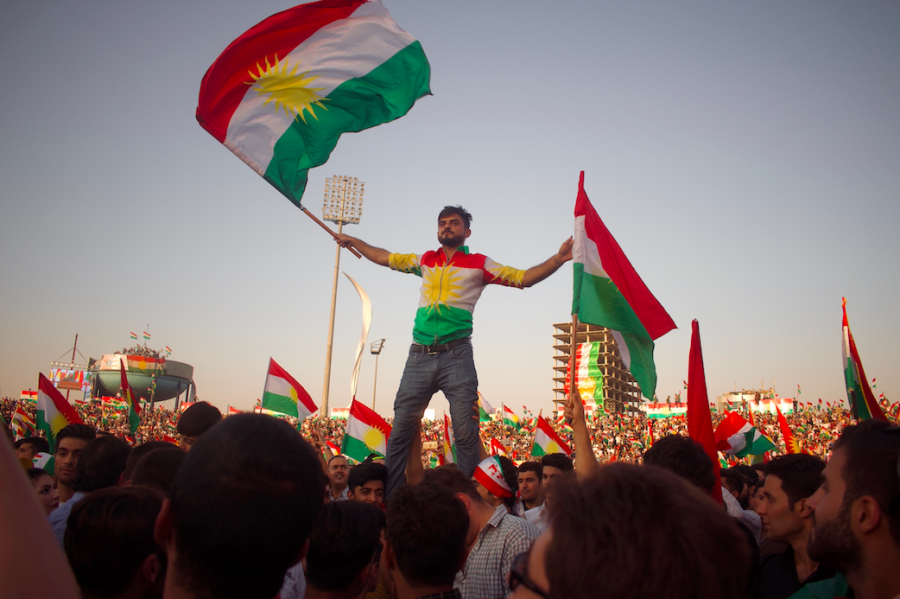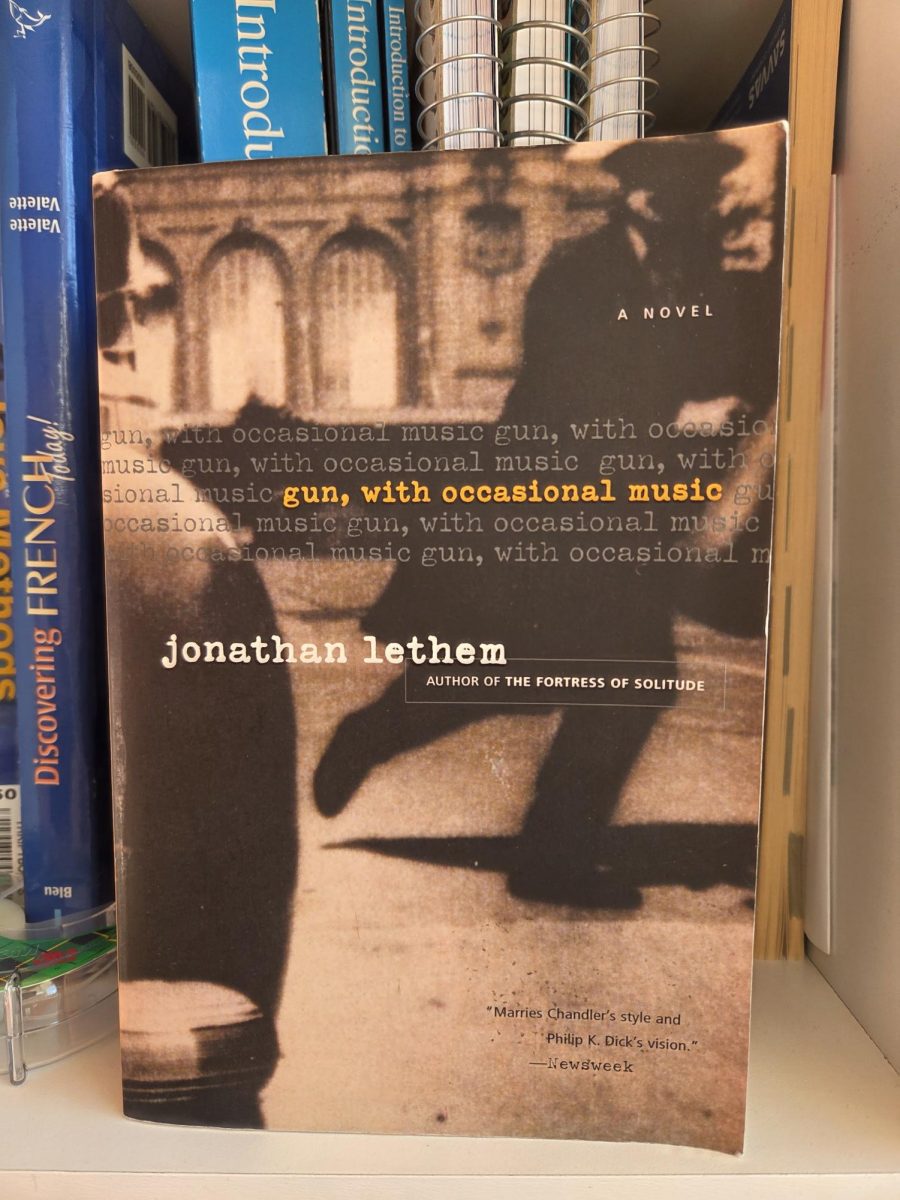Kurds face difficult path to independence
Courtesy of Wikimedia Commons
A man waves a Kurdish flag at a pro-Kurdistan independence rally shortly after the referendum in the city of Erbil, the capital of the Kurdistan region of Iraq. More than 92 percent of the three million voters opted for independence.
November 16, 2017
Kurdish people in northern Iraq held a referendum for independence late September with the intention of raising their negotiating power with Iraq. The vote was held despite widespread opposition from the U.S., U.K., Russia, Iraq, Iran, Syria, Saudi Arabia and Turkey.
The vote was ratified by the regional Kurdish parliament, which had not been assembled in over two years before Sept. 15. This support gave the vote more gravitas in the eyes of the Iraqi government.
The referendum attracted high voter turnout, with over 72 percent of registered voters going to the polls. Referendum results yielded 92 percent for independence and only seven percent against.
Prior to the referendum, Israeli Prime Minister Benjamin Netanyahu expressed his country’s support for the Kurds, making Israel the first state to endorse an independent Kurdish state. The United States, Russia and United Kingdom urged the Kurds to reconsider or postpone the vote, whereas Iraq, Iran and Turkey threatened economic, security and diplomatic sanctions against the Kurdistan Regional Government (KRG). The vote’s legality was also rejected by the Iraqi government.
Dr. Dipak Gupta, a professor of political science at UC San Diego and past Fred J. Hansen professor of peace studies, believes that the main reason so many regional countries were against the prospect of an independent Kurdistan is because of the possibility of the Kurdish state spreading over Iraqi borders.
“The main Kurdish population is centered in Iraq, Turkey, Syria and Iran, so if the Iraqi Kurds gain independence, what is to stop the Kurds in Iran or Turkey from doing the same?” Gupta said. “Turkey has been against this for a century and if it actually happens, it would create even more chaos in the area.”
Shortly after the vote, Kurds celebrated across Iran and Iraq. Many Iranian Kurds sang the national anthem of the Republic of Mahabad, a short-lived Kurdish state in present-day Iran that lasted until 1946, leading to mass arrests.
Iraq halted all flights with the exception of those for military, diplomatic and humanitarian causes to Kurdish international airports. Five days after the referendum, Iraqi and Iranian forces held joint military exercises on the Kurdistan border, closing Iraqi Kurdistan’s border with Iran.
Iraqi forces pushed into northern Kurdish Iraq and captured the city of Kirkuk and its surrounding oil fields on Oct. 15. In order to avoid more conflict, the KRG offered the Iraqi government the opportunity to freeze referendum results and initiate a ceasefire in late October. Later that week, Masoud Barzani announced he would step down from his position as president of Kurdistan.
“The referendum was mishandled on their part; it backfired and weakened the Kurds’ position considerably,” Chuck Freilich, a senior fellow in the Harvard Kennedy Belfer Center for International Affairs, said. “I’d say that they are further from independence than they were before it as they managed to unite just about everybody against them, including people that supported them in the past such as the United States.”
This piece was originally published in the pages of the Winged Post on November 16, 2017.


















![“[Building nerf blasters] became this outlet of creativity for me that hasn't been matched by anything else. The process [of] making a build complete to your desire is such a painstakingly difficult process, but I've had to learn from [the skills needed from] soldering to proper painting. There's so many different options for everything, if you think about it, it exists. The best part is [that] if it doesn't exist, you can build it yourself," Ishaan Parate said.](https://harkeraquila.com/wp-content/uploads/2022/08/DSC_8149-900x604.jpg)




![“When I came into high school, I was ready to be a follower. But DECA was a game changer for me. It helped me overcome my fear of public speaking, and it's played such a major role in who I've become today. To be able to successfully lead a chapter of 150 students, an officer team and be one of the upperclassmen I once really admired is something I'm [really] proud of,” Anvitha Tummala ('21) said.](https://harkeraquila.com/wp-content/uploads/2021/07/Screen-Shot-2021-07-25-at-9.50.05-AM-900x594.png)







![“I think getting up in the morning and having a sense of purpose [is exciting]. I think without a certain amount of drive, life is kind of obsolete and mundane, and I think having that every single day is what makes each day unique and kind of makes life exciting,” Neymika Jain (12) said.](https://harkeraquila.com/wp-content/uploads/2017/06/Screen-Shot-2017-06-03-at-4.54.16-PM.png)








![“My slogan is ‘slow feet, don’t eat, and I’m hungry.’ You need to run fast to get where you are–you aren't going to get those championships if you aren't fast,” Angel Cervantes (12) said. “I want to do well in school on my tests and in track and win championships for my team. I live by that, [and] I can do that anywhere: in the classroom or on the field.”](https://harkeraquila.com/wp-content/uploads/2018/06/DSC5146-900x601.jpg)
![“[Volleyball has] taught me how to fall correctly, and another thing it taught is that you don’t have to be the best at something to be good at it. If you just hit the ball in a smart way, then it still scores points and you’re good at it. You could be a background player and still make a much bigger impact on the team than you would think,” Anya Gert (’20) said.](https://harkeraquila.com/wp-content/uploads/2020/06/AnnaGert_JinTuan_HoHPhotoEdited-600x900.jpeg)

![“I'm not nearly there yet, but [my confidence has] definitely been getting better since I was pretty shy and timid coming into Harker my freshman year. I know that there's a lot of people that are really confident in what they do, and I really admire them. Everyone's so driven and that has really pushed me to kind of try to find my own place in high school and be more confident,” Alyssa Huang (’20) said.](https://harkeraquila.com/wp-content/uploads/2020/06/AlyssaHuang_EmilyChen_HoHPhoto-900x749.jpeg)











